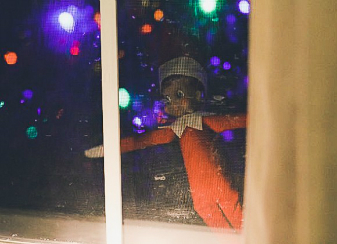TORONTO – The “Elf on the Shelf” has been criticized because of the surveillance aspect of the story — that is, the doll returns to the North Pole each night to report back to Santa on the children’s behavior.
 Dr. Laura Pinto, an assistant professor at the University of Ontario Institute of Technology, wrote a paper last year a paper titled “Who’s the Boss” on the doll, saying the idea of it reporting back to Santa each night on the child’s behavior “sets up children for dangerous, uncritical acceptance of power structures,” according to insideHalton.com.
Dr. Laura Pinto, an assistant professor at the University of Ontario Institute of Technology, wrote a paper last year a paper titled “Who’s the Boss” on the doll, saying the idea of it reporting back to Santa each night on the child’s behavior “sets up children for dangerous, uncritical acceptance of power structures,” according to insideHalton.com.
MORE NEWS: Know These Before Moving From Cyprus To The UK
From her paper:
When children enter the play world of The Elf on the Shelf, they accept a series of practices and rules associated with the larger story. This, of course, is not unique to The Elf on the Shelf. Many children’s games, including board games and video games, require children to participate while following a prescribed set of rules.
The difference, however, is that in other games, the child role-plays a character, or the child imagines herself within a play-world of the game, but the role play does not enter the child’s real world as part of the game. As well, in most games, the time of play is delineated (while the game goes on), and the play to which the rules apply typically does not overlap with the child’s real world.
“You’re teaching (kids) a bigger lesson, which is that it’s OK for other people to spy on you and you’re not entitled to privacy,” she tells the Toronto Star.
She calls the elf “an external form of non-familial surveillance,” and says it’s potentially conditioning children to accept the state acting that way, too.
“If you grow up thinking it’s cool for the elves to watch me and report back to Santa, well, then it’s cool for the NSA to watch me and report back to the government,” according to Pinto.
One year later, she tells EAGnews, “In my view, the fact that our work has received so much media attention both in 2014 and this year seems to point to its relevance (as perceived by the media and among the public), though I’m not sure that recent developments have amplified the relevance.”
Pinto recommends parents discuss the story rules with their kids.
“For example, how do their kids feel about being watched by the elf who reports back?” she says.
“Do kids view this as different from being watched by parents, teachers, or friends? Does the Elf see everything the child does – and is that a problem? Do kids perceive different situations as requiring different levels of privacy? Why or why not? Are there people or elves to whom kids should not share certain details of their lives? Why or why not?
“For parents who prefer not to play by the conventional Elf rules, limitless options exist. The elf can be a visitor sending positive messages from the North Pole, such as suggesting good deeds that children can do during the holidays (parents can look to Kindness Elves for ideas). With the help of parents, the Elf can be a “critical friend” to help kids self-regulate their actions (rather than a toy that reports back to the North Pole in a way that prevents self-reflection).”
Pinto believes the “Elf on the Shelf” is just on way kids may conclude giving up privacy is “normal.”
“In the same way that Barbie (despite lots of criticism) is not solely responsible for shaping people’s perceptions about women’s appearance, but contributes to broader social messages about how women should look – the Elf offers children a small experience with surrendering privacy. Playing with the Elf is certainly not the only experience kids will have with privacy issues, but when combined with lots of other experiences (for example, the controversial Class Dojo, giving up personal information in the course of online gaming or loyalty cards, etc.), children can come away with the idea that giving up privacy is ‘normal.’
“Rather, we hope that the Elf can open up some good conversations among adults, and even between parents and kids, about how different situations call for different degrees of privacy. And hopefully the many public discussions about Elf on the Shelf will encourage parents to think about the messages sent by all toys!”


Join the Discussion
Comments are currently closed.